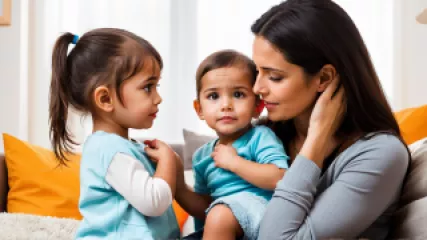How to Support a Child with Childhood Trauma: A Step-by-Step Guide
How to Support a Child with Childhood Trauma: A Step-by-Step Guide
Childhood trauma can have a profound impact on a child's life, affecting their emotional well-being, relationships, and overall development. As a caregiver or concerned adult, it is essential to provide the necessary support and understanding to help a child navigate through the challenges of childhood trauma. In this step-by-step guide, we will explore effective strategies and techniques to support a child with childhood trauma.
Step 1: Educate Yourself about Childhood Trauma
Before diving into supporting a child with childhood trauma, it is crucial to educate yourself about the topic. Gain a comprehensive understanding of what childhood trauma entails, its potential causes, and its impact on a child's development. This knowledge will help you approach the situation with empathy and make informed decisions regarding the child's well-being.
Take the time to read books, attend workshops, or consult with professionals specializing in childhood trauma. By equipping yourself with knowledge, you will be better prepared to provide the necessary support and guidance.
Step 2: Create a Safe and Nurturing Environment
Children who have experienced trauma need a safe and nurturing environment where they feel secure and supported. Create a space where the child feels comfortable expressing their emotions and sharing their experiences without judgment.
Ensure that the child's physical needs are met, such as providing nutritious meals, a stable home environment, and access to healthcare. Establish consistent routines and clear boundaries to help the child feel a sense of stability and predictability in their daily lives.
Additionally, encourage open communication and active listening. Let the child know that their feelings are valid, and create opportunities for them to express themselves through art, play, or writing. Validate their emotions and provide reassurance that they are not alone.
Step 3: Build Trust and Establish a Supportive Relationship
Building trust is a crucial aspect of supporting a child with childhood trauma. Traumatic experiences can lead to a breakdown in trust, making it essential to establish a supportive and consistent relationship with the child.
Show empathy and understanding towards the child's experiences. Be patient, as building trust takes time. Avoid making promises that you cannot keep and maintain a consistent presence in the child's life. By being reliable and dependable, you can help the child feel secure and develop a sense of trust.
Developing a strong bond with the child involves active engagement. Spend quality time together engaging in activities that the child enjoys. This will help foster a sense of connection and create positive associations with the support you provide.
Step 4: Encourage Emotional Expression and Regulation
Children who have experienced trauma may struggle with regulating their emotions. Encourage the child to express their feelings in healthy ways and provide them with tools to manage their emotions effectively.
Teach the child coping mechanisms such as deep breathing exercises, journaling, or engaging in physical activities like yoga or sports. These techniques can help the child regulate their emotions and reduce anxiety and stress.
Additionally, validate the child's emotions and avoid dismissing or minimizing their experiences. Create a safe space for them to talk openly about their feelings and experiences without fear of judgment.
Step 5: Seek Professional Help and Online Therapy
While your support is vital, it is essential to recognize when additional help is needed. Childhood trauma is complex, and professional intervention may be necessary to address the child's specific needs.
Consider consulting with a therapist or counselor who specializes in childhood trauma. They can provide expert guidance and recommend appropriate interventions tailored to the child's unique circumstances.
Online therapy can be a valuable resource for children with childhood trauma. It offers convenience and accessibility, allowing the child to receive support from the comfort of their own environment. Through online platforms, therapists can provide individualized treatment plans and support the child's healing process.
Step 6: Foster Resilience and Empowerment
Resilience is crucial for children recovering from childhood trauma. Help the child develop resilience by focusing on their strengths and encouraging them to build healthy coping mechanisms.
Acknowledge the child's accomplishments and celebrate their progress, no matter how small. Encourage them to set realistic goals and support their efforts to achieve them. By fostering resilience, you empower the child to overcome adversity and thrive despite their traumatic experiences.
Step 7: Practice Self-Care
Supporting a child with childhood trauma can be emotionally demanding. It is vital to prioritize self-care to ensure you have the necessary energy and emotional well-being to provide effective support.
Engage in activities that recharge and rejuvenate you. This may include exercise, hobbies, spending time with loved ones, or seeking support from a therapist or support group for caregivers.
Remember, self-care is not selfish—it is essential for your well-being and your ability to support the child effectively.
In conclusion, providing support for a child with childhood trauma requires patience, empathy, and a commitment to their healing journey. By educating yourself, creating a safe environment, building trust, encouraging emotional expression, seeking professional help when needed, fostering resilience, and practicing self-care, you can make a positive impact on the child's recovery.
Remember, each child's journey is unique, and there is no one-size-fits-all approach. Tailor your support to meet the specific needs of the child and seek guidance from professionals when necessary. Together, we can help children with childhood trauma find healing, resilience, and hope.






